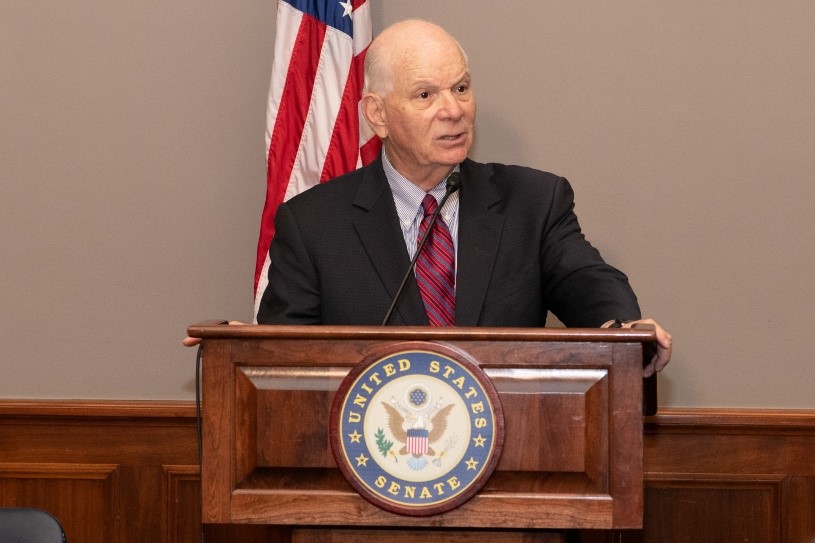WASHINGTON – U.S. Senator Ben Cardin (D-Md.) unveiled legislation Tuesday that will hold private prisons that receive federal funds to the same transparency standards as federal prisons. After welcoming an expert panel hosted by Open the Government, Citizens for Responsibility and Ethics in Washington (CREW) and the American Civil Liberties Union (ACLU), Senator Cardin officially introduced S. 2773, the Private Prison Information Act (PPIA), which would mandate private prisons with federal inmates and detainees be bound by the Freedom of Information Act (FOIA). In addition to Cardin, the legislation is cosponsored by Senator Patrick Leahy (D-Vt.), as well as Senators Ron Wyden (D-Ore.), Jeff Merkley (D-Ore.), Richard Blumenthal (D-Conn.), Dianne Feinstein (D-Calif.), Chris Van Hollen (D-Md.), Cory Booker (D-N.J.), Bernie Sanders (I-Vt.), Kamala Harris (D-Calif.), Kirsten Gillibrand (D-N.Y.), Bob Casey (D-Pa.), Amy Klobuchar (D-Minn.) and Elizabeth Warren (D-Mass.).
“Private prisons account for 20 percent of our federal prison and detention population and 70 percent of all immigration detainees. Yet the operators of private prisons hide behind loopholes in the law when it comes to how they perform their job. If they are receiving federal funds and housing federal inmates and detainees, they must be held accountable to the same standards as our federal prisons,” said Senator Cardin.
More than 25 percent of all people in federal custody are held in private prisons and detention facilities and, since 2000, the number of people housed in private prisons has increased by 39 percent. The Department of Justice Inspector General has found that federal prisons run by private companies are substantially less safe and secure than ones run by the federal Bureau of Prisons.
S. 2773, the Private Prison Information Act (PPIA) has been endorsed by: Open the Government, ACLU, NAACP, Human Rights Watch, Southern Poverty Law Center, Citizens for Responsibility and Ethics in Washington (CREW), FreedomWorks, Taxpayers Protection Alliance, Project on Government Oversight (POGO), and the Rutherford Institute, among others.
“For-profit prisons should no longer be able to use their status as private entities to bypass the public access and information laws with which federal prisons must comply,” said Lisa Rosenberg, executive director of Open the Government. “The PPIA will help close this FOIA loophole and mitigate waste and abuse of taxpayer dollars by holding corporations accountable for their contractual obligations to the federal government.”
“Currently, oversight of America’s private prisons is limited to the federal agencies overseeing them, leaving the American people without any way of knowing how their taxpayer dollars are being spent and keeping them in the dark about how private prisons are being operated, even as private prison companies pour millions into politics.Without oversight, profit-driven private prisons are exempt from the Freedom of Information Act (FOIA) and shielded from sufficient public accountability,” said CREW Executive Director Noah Bookbinder, “The Private Prison Information Act will build on FOIA to ensure the American people have access to key information about private prisons in order to hold this multi-billion industry accountable for its actions.”
“For the last 40 years, the Freedom of Information Act has been critical in guaranteeing transparency in government. The private prison industry is now responsible for the incarceration of tens of thousands of federal prisoners, and detention of over 70 percent of all immigrant detainees, but is not obligated to provide the public with critical information under the law. The Private Prison Information Sharing Act will ensure that the public has access to the records necessary to ensure that they are holding these entities accountable,” said Eunice Cho, Senior Staff Attorney, ACLU National Prison Project.
Watch the full panel discussion HERE


According to Open the Government and the ACLU, since its enactment more than 40 years ago, the Freedom of Information Act has increased governmental transparency by improving access to government records for the media and the general public. Expanded transparency is integral to governmental accountability and is especially vital when the government spends taxpayer dollars contracting out public services that raise potential risks to individual liberty and safety. By asserting their status as private entities, private prison companies exempt themselves from the FOIA. Consequently, records that could help inform the public about the performance of these entities, such as incident reports, information on spending and misuse of federal funds, and communications between prison officials, are withheld from the public. The equivalent records for federally run facilities are subject to FOIA. This legislation would create a critically important mechanism by which federal agencies can ensure that non-federal entities provide the information necessary for the government to respond to FOIA requests relating to prison and detention facilities, while still allowing the government to protect confidential, privileged, and sensitive information from public disclosure under existing exemptions and exclusions to FOIA.
###

